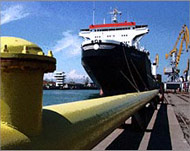Russia rejects Tokyo plea on oil pipeline
Moscow on Sunday refused to accede to Tokyo’s request to construct an oil pipeline along Russia’s Pacific coast that will ease the energy shortage in Japan.
 |
| Russia unwilling to risk longer pipeline |
Japanese Foreign Minister, Yoriko Kawaguchi, on a weekend visit to the Pacific port city of Vladivostok in Russia’s far east, held talks with Russian Deputy Prime Minister Viktor Khristenko on the pipeline project, for which Tokyo has been lobbying furiously.
But Khristenko said that Moscow was not ready to make a decision on constructing an oil pipeline along the Pacific coast to Nakhodka, on the Sea of Japan.
“The decision on building the pipeline to Nakhodka will be made after a full examination of the project which would include economic, technical and ecological aspects,” Khristenko told reporters.
Both Tokyo and Russia’s far eastern regional authorities are pushing for the Nakhodka route, a 4,000-km pipeline from Angarsk, near Lake Baikal in eastern Siberia.
But the cost would be about $ 5 billion and the Russian government favours a shorter oil pipeline to China, a 2,400-km project that would cost about $ 2.5 billion.
Cost sharing
Japan is willing to foot some of the costs, pledging to take part in construction and geological research and to invest one billion dollars in building an oil port on the Sea of Japan.
Russia had originally sought to reconcile rival demands on Siberian oil by Beijing and Tokyo, by promising to build oil export pipelines to both Daqing in China and Nakhodka on the Pacific coast.
However, in early 2003, Prime Minister Mikhail Kasyanov said that Russian oil export capacity was sufficient to justify building an oil pipeline to China, but not yet enough for the Pacific route.
Then during a visit by Chinese President Hu Jintao in May, Russia’s Yukos oil giant and China National Petroleum Corporation (CNPC) signed a 25-year deal to supply oil through a pipeline to China, which was considered a clear sign that Russia intended to abandon the Nakhodka project.
The Angarsk-Nakhodka pipeline, which could potentially open markets in the Far East and the US west coast, would need to carry at least 50 million tonnes of crude a year to be viable.
The shorter Chinese route would need to transport just 20 million tonnes a year to be economic.